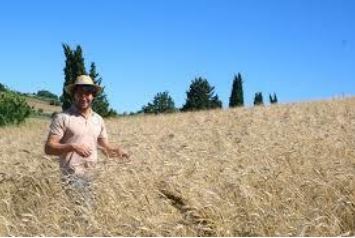Grappi’s Farm
Success Story
The Luchino Grappi’s Farm is located in Pienza, a small village in the province of Siena (Tuscan region, Italy). The farm has a surface area of 165 ha with 3 people as permanent staff. They are cultivating the following crops: durum wheat (Triticum durum L.), olive (Olea europaea L.), field bean (Vicia faba subsp. Minor), chickpea (Cicer aretinum L.), and different types of clovers. The farmer applies organic cultivation techniques over the entire cropped surface.
They apply some of the practices of regenerative agriculture (RA), i.e. the application of crop rotation as well as the use of cover crops. Regarding soil tillage, they usually perform conventional plowing, but also they substitute it with disk harrowing. In addition, it is an organic farm, hence it cannot cultivate the same crop for two following years, and legumes are commonly used as cover crops; the previous practices are applied to the overall field, and although they have never heard about regenerative agriculture they apply them. No training was received for applying them. After the application of crop rotation as well as the use of cover crops, they experienced an increase in grain yield, better soil fertility, and a lower weed problem.
LABELS: Italy, crop-production, organic
|
GENERAL INFORMATION |
|
Location of farm |
Pienza (Siena, Italy) |
|
Name of the farmer |
Luchino Grappi |
|
Size of farm |
165 ha |
|
Permanent staff |
3 |
|
Main products of farm |
Durum wheat, olive, lentils, chickpea, clovers |
|
CURRENT REGENERATIVE AGRICULTURE PRACTICES ON THE FARM |
|
Farmland cultivated with RA practices |
All |
|
Crops produced with RA practices |
All |
|
Duration of using RA practices |
Since 2007 |
Read more information in pdf...

The REGINA project (No. 2021-1-HU01-KA220-HED-000027629) was funded by the European Commission. The content of this website does not necessarily reflect the views of the European Commission.
Call 2021, KA220 – Cooperation Partnerships in Higher Education
The European Commission’s support for the production of the publications does not constitute an endorsement of the contents, which reflect the views only of the authors, and the Commission cannot be held responsible for any use which may be made of the information contained therein.


